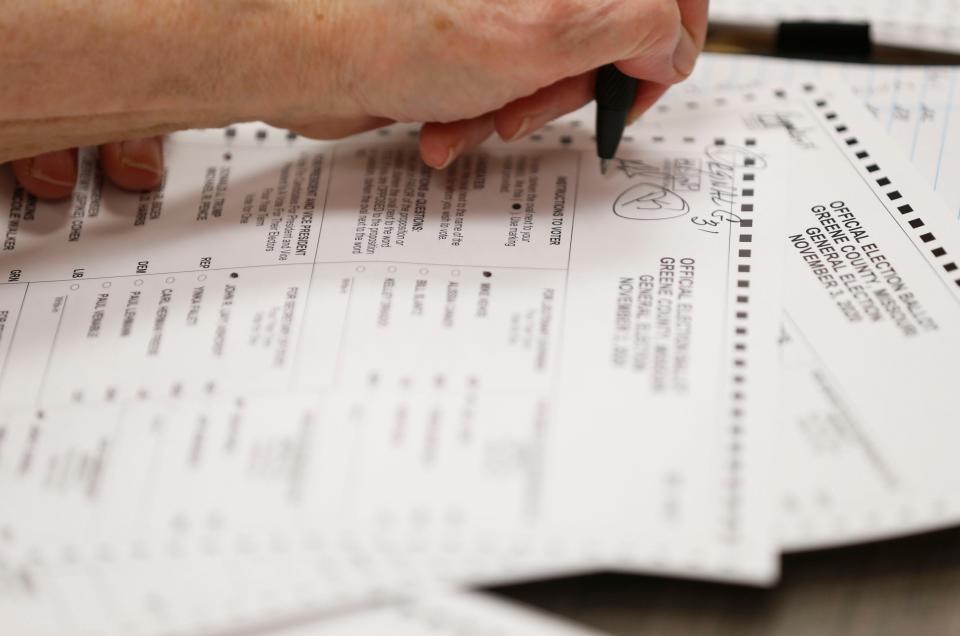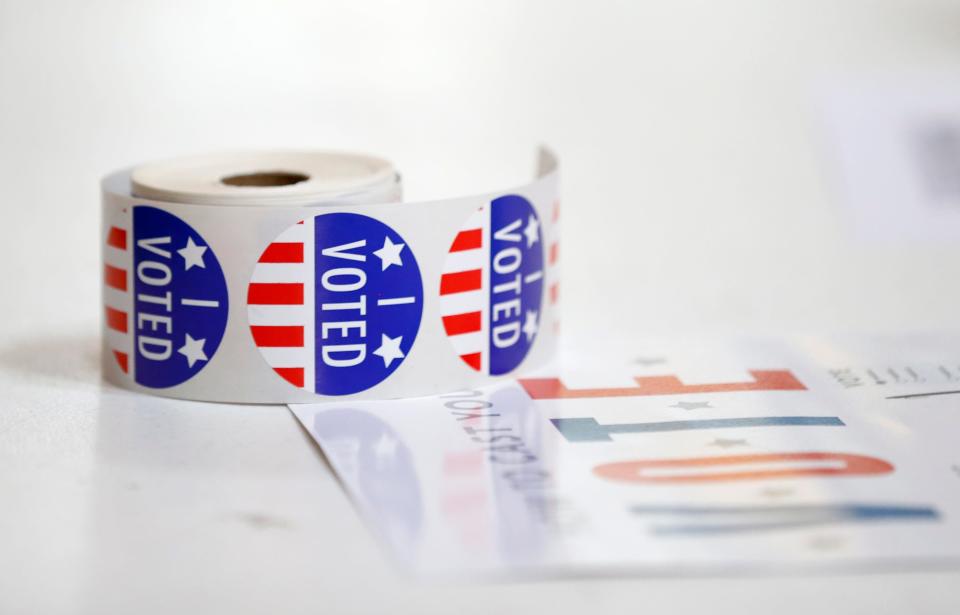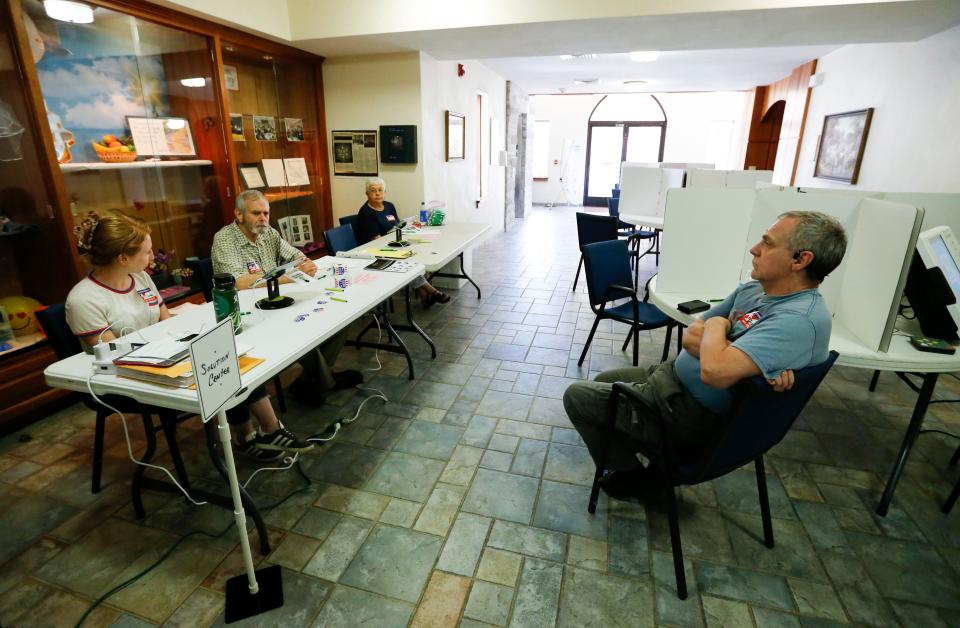Ballot initiative process sure to be in GOP's crosshairs during legislature's 2024 session
Missouri lawmakers will once again consider changes to the initiative petition process in the new year.
Several pieces of legislation aimed at altering the process through which voters can approve changes to the Missouri Constitution were among the bills pre-filed for the 2024 legislative session, which starts Jan. 3.
Pre-filing started Dec. 1, with 1,028 bills and joint resolutions filed in the Missouri House and Senate combined within the first week through Dec. 7. Of those, there are 10 pieces of legislation in the House and 11 more in the Senate targeting initiative petitions.
While many of the pre-filed bills will never be debated during the 2024 legislative session, the volume of bills on this specific topic all but guarantees initiative petition changes in some form will be discussed next year.
One piece of legislation — the only proposal filed by a Democrat — aims to make it more difficult for legislators to alter changes enacted through successful initiative petitions. The remaining bills, all filed by Republicans, seek to either raise the bar for approving ballot initiatives, regulate signature collection and out-of-state funds backing measures or implement other policy changes making it more difficult for citizens to take proposals to a public vote.
During the 2023 legislative session, there were efforts to increase the requirement for passing a ballot initiative from a simple majority of the public vote to 57% approval. That legislation didn't pass the finish line, as Senate filibusters in the final days of the session stymied progress.
However, many Republican lawmakers have new goals in mind for changing the requirements for approval. Ten of the pre-filed bills would institute rules requiring a majority of voters statewide and a majority of voters in each of the state’s eight congressional districts approve a ballot initiative for it to pass.
Two other proposals would require approval from a majority of voters statewide and a majority of voters in the state’s 34 Senate districts, with two more requiring affirmative votes from a majority of statewide voters and voters in the state’s 163 districts in the Missouri House of Representatives.
Another common theme in the proposed legislation is the enactment of requirements stating that voters must be registered to vote in Missouri and citizens of the United States, stipulations already in place for voters to participate in state elections.
Additionally, many lawmakers expressed concern about foreign influence and out-of-state money impacting ballot initiatives. So far, at least seven bills propose either restricting donations and sponsorship of petitions by foreign countries or enacting regulations on out-of-state donations or signature gatherers.
Any change to the initiative petition process lawmakers might approve would require a public vote before it could take effect, with the existing standard of a simple majority required for success.
A brief history of ballot initiatives in Missouri
Missouri has allowed for changes to be made via the initiative petition process since 1907. Petitions are put before voters during even-numbered years, matching the election cycle for the Missouri House of Representatives.
Although hundreds of petitions are filed each election cycle, very few of those make it to the ballot. In order to do so, supporters of a constitutional amendment must gather signatures from two-thirds of Missouri’s congressional districts, with the number required equal to 8% of the votes cast for governor in the most recent gubernatorial election.
The requirement is lower for initiatives that would change state law, rather than the constitution, or for referendums seeking to overturn a law passed by the legislature. In that case, the requirement is only 5% of the votes for governor in the last gubernatorial election in two-thirds of Missouri’s congressional districts. These kinds of petitions have become less popular, however, because they can be altered by the Missouri General Assembly, whereas a constitutional amendment can only be changed through another affirmative majority vote by Missourians.
Between 1910 and 2022, 95 ballot initiatives have been put before Missourians for a vote, of which 43 have passed. Topics voted on include human cloning, puppy mills, payday lending, tobacco taxes, Medicaid expansion, campaign finance, marijuana legalization and term limits for elected officials.
In recent years, issues such as Medicaid expansion and marijuana legalization, which some perceive to be more liberal, have passed by a vote of the people when they have been unsuccessful in the legislature.
Currently, there are 172 petitions filed with the Missouri Secretary of State’s office for this election cycle. Among those are petitions seeking to legalize abortion, with varying restrictions; raise the state's minimum wage and ensure sick leave; as well as others that would legalize sports betting or authorize a casino at the Lake of the Ozarks.
More: Initiative petitions came under fire in 2023. Experts forecast more of the same in 2024.
Lawmakers share their reasons for changing the initiative petition process
Some legislators feel that recent measures have bloated the Missouri Constitution into a behemoth document. The initiative petition legalizing recreational marijuana, for example, added an additional 49 pages.
“Although intended to contain the framework for how the state operates, it has constantly been amended with issues better suited for statute,” said state Rep. Hardy Billington, R- Poplar Bluff, in an emailed statement. “It currently contains over two hundred pages and is cluttered with sections on issues such as bingo, marijuana, and storm water drainage. It is now the 4th largest state constitution in the nation.”
Billington filed legislation seeking to increase the number of signatures required for a ballot initiative to be included on the ballot. His bill, HJR67, would require signatures from 5% of the votes for governor in the last gubernatorial election in all congressional districts.
“Right now when groups petition to get an amendment on the ballot, they don’t come down to the eighth congressional district where I live,” Billington said. “They focus on the urban districts in the I-70 corridor. In addition to ignoring my district, a measure could be placed on the ballot without a single signature from the sixth district which covers the entire northern swath of our state.”
Billington isn’t alone in his desires to see more statewide participation in the initiative petition process. Although his is the only bill so far that seeks to alter this aspect of the process, one of his fellow House members wants to ensure that only Missourians are involved in collecting signatures and filing lawsuits against initiative petitions.

Rep. Mike Haffner, R-Pleasant Hill, filed HB1749, which would rewrite several of the rules pertaining to placing an initiative petition on the ballot.
“What this bill does is it makes sure that it's Missourians that are involved in the signature gathering process,” Haffner said. “It makes sure that it's Missouri money involved in changing the Missouri Constitution so that we control what is taking place with our own constitution, not out-of-state interests.”
Haffner’s legislation would also prohibit practices that pay signature gatherers per signature collected, which he feels will reduce the incentive to enter fraudulent signatures.
“The Eighth Circuit Court of Appeals has said very clearly that it prohibits compensation of the petition circulators on a payment by signature basis, because it says you're motivating an individual to get involved in fraud, to make up the signatures because that's how you're paying them,” Haffner said.
He has worked closely for more than a year with legal counsel at the Missouri Secretary of State’s Office to ensure that his legislation meets legal standards and precedent. Under the bill, only a Missouri voter can bring legal challenges against petitions.
“When we have these things filed, almost always there's a lawsuit involved in this. Well, the majority of time the people that are filing the lawsuits are outside of the state of Missouri,” Haffner said. “So what this bill does is it guarantees that the standing to bring a lawsuit is that you have to be a Missouri registered voter. That only makes sense.”
Additionally, Haffner’s legislation would invalidate signatures collected under ballot summary language that is later changed by the court. This has been the topic of some debate for those seeking to legalize abortion through initiative petitions, while their ballot summary language has been debated in court.
Rep. Bill Falkner, R-St. Joseph, thinks that Missourians should have more opportunity to review the contents of an initiative petition. His legislation, HJR93, seeks to set a requirement that each initiative petition should receive a hearing in the Missouri General Assembly.
“They could bring it through the General Assembly so it could be vetted just like any other bill. The language cannot be changed, but it gets its public hearing so people can actually watch the hearings on this issue,” Falkner said. “It goes to floor debate in both the House and the Senate. Then it's moved on to where it can then go to the next election in November and pass with a simple majority.”
If a petitioner did not want to go through this process, then the initiative petition would have a threshold of 55% voter approval in order to be passed.
“It's basically saying, if you have faith in your bill, that it's a good bill and an honest bill, you can pass it with a simple majority,” Falkner said. “We just want to let people know what they're voting on.”

Rep. Ed Lewis, R-Moberly, filed HJR72, one of the ten bills seeking to institute new requirements to approve a ballot initiative with both a majority of statewide voters and the affirmation of voters in the majority of the state’s congressional districts.
“Our constitution has been under assault,” Lewis said. “It's been changed frequently by both the legislature and by initiative petition. Those changes should be going into statute not into the constitution.”
He feels that many measures like recreational marijuana were passed largely by voters in urban areas, while rural voters, like those he represents, are not able to have their voices heard.
“Those people in the urban centers are overwhelming the rural vote and the rural people I represent want representation as well, if you're going to change the constitution,” Lewis said. “I don't care about statute. They do that with statute all you want. But when you're trying to change the constitution, it's good to have a broader representation of the state of Missouri.”
More: Missouri voter registration guide: Checking voter registration status, options to vote
Advocates oppose altering Missourians’ right to initiative petition
While 20 bills have been filed by Republican lawmakers seeking to change the initiative petition process, only one was filed by a Democrat. Rep. Joe Adams, D-University City, filed HJR 80, which would restrict the ability of the legislature to alter ballot initiatives passed by voters, except by referendum.
“People are putting things on the ballot because the legislature isn't doing what the people are requesting or wanting,” Adams said. “When people do put a simple change in the law, not a constitutional amendment, the state legislature has gone back and reversed what the people have voted for.”
He feels this legislation will increase the chances of the legislature keeping the will of the voters intact.
“My idea was to give the people some feeling that if they put an initiative on the ballot, it can stay there and not be changed quickly by just a piece of legislation by the legislature, so that they would have to do something else to change it if they didn't like it,” Adams said.

Other groups are opposing changes to the initiative petition process. Marilyn McLeod of the League of Women Voters says that the group opposes any attempt to make it harder to get a measure on the ballot, or raise the bar for approval.
“The citizen initiative petition is the most direct form of voter participation in our democracy,” McLeod said in an emailed statement. “This valuable and trusted process has been enshrined in the Missouri Constitution for more than 100 years and has been used for both conservative and progressive issues. It is already a complicated and difficult process.”
Missouri REALTORS has launched a new political action committee, Missourians for Fair Governance, to monitor any legislation aimed at overhauling the process. Spokesperson Scott Charton said they will be carefully monitoring the progress of these bills as the session progresses.
“We will be closely watching this 2024 legislature,” Charton said. “If politicians try to fool Missourians into weakening their own right to direct democracy and to oversee those politicians, Missourians for Fair Governance is ready to lead a coalition to protect our citizens rights and defeat such a proposal.”
Missouri REALTORS have a long history of involvement in the initiative petition process. In 2010, the group successfully used a ballot initiative to defeat a potential sales tax on transferring home ownership, after observing similar taxes being imposed in other states.
In 2016, the organization observed another national trend of imposing taxes on services, rather than just on tangible goods. Missouri REALTORS used another ballot initiative to block any such taxes from being enacted in the state.
Their motivation for getting involved through their PAC is not centered around any single issue being proposed as an initiative petition. Rather, they seek to protect the voices of Missourians expressed through the initiative petition process.
“Our opposition to restricting or eliminating the initiative petition process has nothing to do with picking a side on any partisan issue. Special interests want you to believe it's about partisanship. Repeatedly, the initiative petition process has given the citizens of this state the power to reform government, limit political overreach and protect Missouri through bipartisan issues,” Missouri REALTORS said in a statement from September.
Charton feels it is unlikely that these bills will gain much traction with the voters, who would ultimately have to approve changes to the initiative petition process.
“Missourians believe in majority rule, not weakening by surrendering their power to the politicians,” Charton said. “Missourians are too smart to weaken their own power to take matters directly to the ballot, and Missourians are going to want to preserve their voice and their power.”
This article originally appeared on Springfield News-Leader: Missouri Republicans aim to change initiative petition process in 2024

